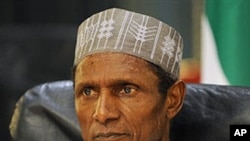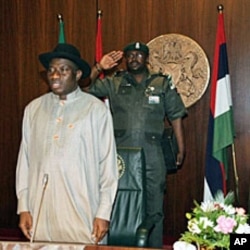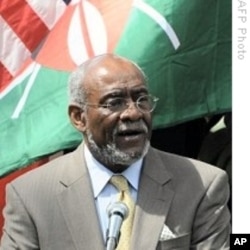Nigerian President Umaru Yar’Adua’s return home last week has rekindled the question of who is in charge of governing Africa’s most populous country. Mr. Yar’Adua, who has been suffering from acute pericarditis and a chronic kidney ailment, made an almost clandestine return under tight security early Wednesday from three months of intensive care in Saudi Arabia. He has not been seen or heard from since then. The chief executive’s return followed on the heels of Vice President Goodluck Jonathan’s elevation by parliament and the national cabinet on 9 February to the post of acting president, pending Mr. Yar’Adua’s recovery.
Nigerian-born, U.S.-based human rights attorney Emmanuel Ogebe has been travelling around his country of origin during the past week. He says that it will take more than just parliament, the cabinet or state governors to resolve the unspecified duties and leadership protocols of the president that, despite legislative intervention, have yet to be delineated for Mr. Jonathan.
“Just the games, and the lies, and the deceit is mindboggling. And the acting president has tried to see the president several times. And it’s our understanding that not even the security aides have seen him. Literally, a bunch of troops have been called out to ensure that no one was around to be able to see exactly what was brought into the country. So it’s quite unsettling, and the mystery just deepens. But right now, there’s been a clarification that Goodluck Jonathan is still acting president,” he said.
By voting last Wednesday to limit to 14 days the time Nigerian executives can be away from office without informing their legislature, Ogebe says the Nigerian Senate set a significant new standard that attorney Ogebe says helps clarify the current national dilemma of who is in charge.
“This is actually a very, very important constitutional amendment because we have a bunch of governors who like to go globe-trotting. And so you find governors who are going to be gone for weeks on end. Some governors even go abroad to attend Harvard (University) government school (in the United States), and so on, without leaving effective replacement behind. So this is a very important constitutional amendment to insure that there is a chain of command and a protocol for management in the absence of the chief executive,” he explained.
U.S. and British officials have been offering support to Acting President Jonathan to help avert fears of a possible power struggle. Despite concerns that the foreign consultations might be viewed as interference in internal politics, Emmanuel Ogebe says that to the contrary, Nigerians overall are welcoming U.S. support for their acting president.
“In fact, Mr. Jonathan has had a string of good luck in the sense that (former) President (George W.) Bush and Prime Minister Tony Blair happened to visit him within his first few days in office. So that certainly was a big boost to his credibility,” he argued.
Ogebe says that Mr. Jonathan has also received a visiting military delegation from Niger, “and it’s kind of ironic that the military regime in Niger recognizes him more that the military in Nigeria.”
In addition, Assistant Secretary of State for African Affairs Johnnie Carson told the U.S. Congress last week that Britain and the United States are offering assistance to Nigeria’s trouble-plagued electoral commission, which hopes to be in place for an anticipated presidential vote in 2011.
Secretary Carson also told reporters last week that he has been in touch with former Nigerian military leader Ibrahim Babangida, not, in Mr. Carson’s explanation, to promote his possible return to Nigeria’s national stage, but rather to console him over the recent loss of General Babangida’s wife to cancer.
For the most part, says the visiting attorney, Nigerians in the street have embraced Acting President Goodluck Jonathan in a show of unity and support for the country in a time of crisis.
“Definitely, he does have quite an appeal to Nigerians on the street, firstly because of his name – and Nigerians can be very superstitious about names and significances. And his streak of luck (no pun intended) has been incredible. So, yes, there is a feeling that he was destined to be there. Also the fact that the vacuum has been resolved is cause for rejoicing among Nigerians,” he said.
The Washington attorney says that barring complications down the road should Yar’Adua supporters press for his own reinstatement, Acting President Goodluck Jonathan has a possible advantage of pursuing election on his own slate next year because his record is unburdened by affiliation with longstanding political structures within the country. Ogebe says Mr. Jonathan has recently been praised for showing skills in moderating some the militancy that earlier had disrupted chances for a settlement of the crisis in the Niger Delta, where Mr. Jonathan previously had as governor in oil-rich Bayelsa State.






